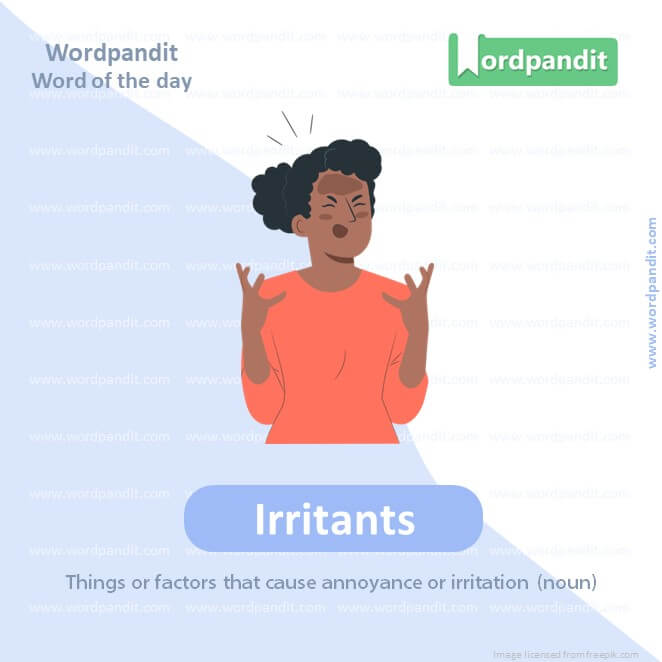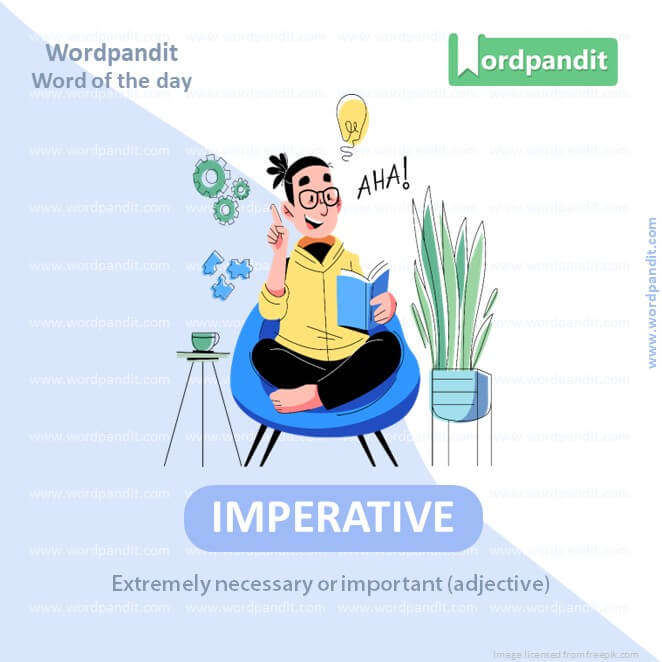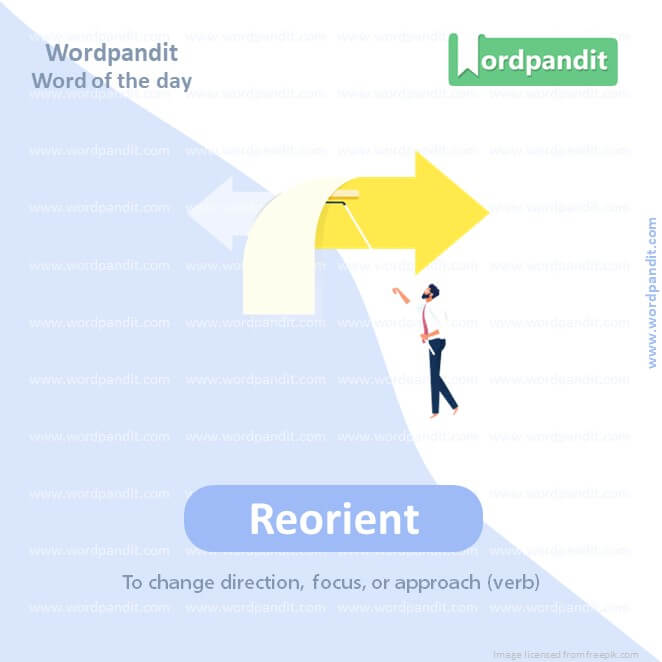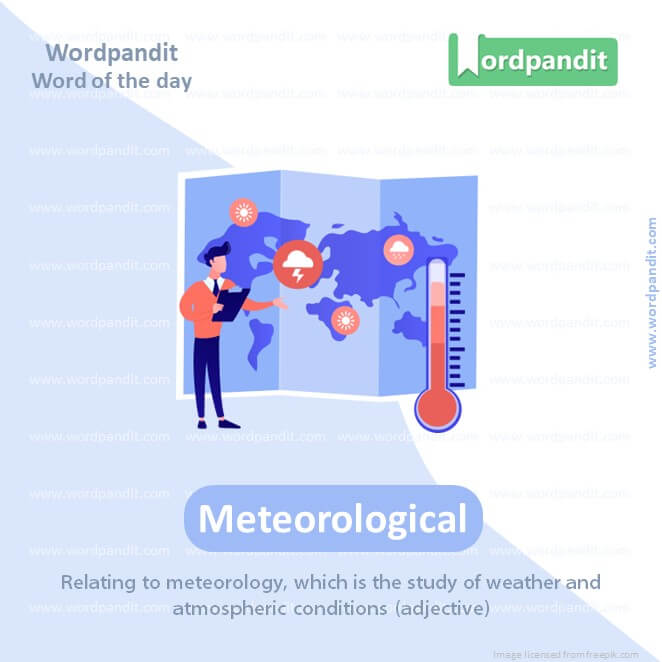Daily Vocabulary Words: List of Daily Used Words
Hi there. Welcome to this special section @ Wordpandit.
Our endeavour here is straightforward: highlighting important daily vocabulary words, you would encounter in The Hindu. This is your repository of commonly used words; essentially, we are posting a list of daily used words. Hence, this has significant practical application as it teaches you words that are commonly used in a leading publication such as The Hindu.
Visit the website daily to learn words from The Hindu.

WORD-1: IRRITANTS
CONTEXT: As with other alliances in States such as Tamil Nadu, the ideological coherence and the compatibility of social bases have served as the glue for the INDIA bloc in Bihar but the nature of the constituent parties and their recent histories have thrown up irritants in seat sharing.
SOURCE: The Hindu
EXPLANATORY PARAGRAPH: Imagine having an itch that won’t go away, or someone making a loud noise that bothers you. These things that bother or annoy you are called “irritants.” They are like little things that can make you feel uncomfortable or frustrated.
MEANING: Things or factors that cause annoyance or irritation (noun).
PRONUNCIATION: IH-ri-tuhnts
SYNONYMS: Annoyances, nuisances, bothers, agitations, disturbances
USAGE EXAMPLE:
1. Dust and pollen are common irritants for people with allergies.
2. The constant noise from construction was an irritant to the residents.
3. The delays in the project were major irritants for the team.
4. She avoided using certain skincare products to prevent skin irritants.

WORD-2: IMPERATIVE
CONTEXT: The relative decline of the Mandal parties and the rise of the BJP have made it imperative for the former to reinvent their positions to move beyond their reliance on strongmen and narrow identity politics.
SOURCE: The Hindu
EXPLANATORY PARAGRAPH: Imagine you have a task that must be done right away because it’s very important. That task is “imperative.” It means something that is crucial or essential, something that cannot be ignored.
MEANING: Extremely necessary or Important (adJective)
PRONUNCIATION: ihm-PER-uh-tiv
SYNONYMS: Essential, crucial, vital, necessary, urgent
USAGE EXAMPLE:
1. It is imperative that we finish the project before the deadline.
2. Safety precautions are imperative in hazardous work environments.
3. The doctor emphasized the imperative need for regular exercise.
4. Following the instructions carefully is imperative for success.
WORD-3: REINVENT
CONTEXT: The relative decline of the Mandal parties and the rise of the BJP have made it imperative for the former to reinvent their positions to move beyond their reliance on strongmen and narrow identity politics.
SOURCE: The Hindu
EXPLANATORY PARAGRAPH: Imagine you have a toy that’s old and broken, but you fix it and make it work like new again. That’s called “reinventing” the toy. It means to change or improve something significantly, making it feel new or different.
MEANING: To change or improve something significantly, often making it feel new or different (verb).
PRONUNCIATION: ree-in-vent
SYNONYMS: Revamp, overhaul, transform, innovate, rejuvenate
USAGE EXAMPLE:
1. The company decided to reinvent its brand image to attract younger customers.
2. She reinvented herself by starting a new career in her 40s.
3. The chef reinvented traditional recipes with modern twists.
4. The artist constantly reinvents her style to stay relevant in the industry.
WORD-4: EMULATE
CONTEXT: While the Congress has done well to reorient its focus on social justice, bringing itself closer to the RJD, it should avoid the temptation to emulate these aspects of old Mandal politics that prioritised casteist identities as the basis for political mobilisation.
SOURCE: The Hindu
EXPLANATORY PARAGRAPH: Imagine you have a role model whom you admire and want to be like. When you try to copy or imitate their actions or qualities, you’re trying to “emulate” them. It means to imitate someone you admire.
MEANING: To imitate or copy someone’s behavior, actions, or qualities, especially because you admire them (verb).
PRONUNCIATION: EM-yuh-leyt
SYNONYMS: Imitate, mimic, copy, mirror, replicate
USAGE EXAMPLE:
1. He emulated his favorite athlete’s training regimen.
2. The young artist tried to emulate the techniques of famous painters.
3. Students are encouraged to emulate positive role models.
4. The company aims to emulate the success of its competitors.

WORD-5: REORIENT
CONTEXT: While the Congress has done well to reorient its focus on social justice, bringing itself closer to the RJD, it should avoid the temptation to emulate these aspects of old Mandal politics that prioritised casteist identities as the basis for political mobilisation.
SOURCE: The Hindu
EXPLANATORY PARAGRAPH: Imagine you’re going on a trip, but you realize you’re heading in the wrong direction. So, you turn around and head the right way. That change in direction or focus is called “reorienting.” It means to change or adjust the direction or focus of something.
MEANING: To change direction, focus, or approach (verb).
PRONUNCIATION: ree-awr-ee-ent
SYNONYMS: Redirect, readjust, realign, refocus, reposition
USAGE EXAMPLE:
1. The company needed to reorient its marketing strategy for the new product.
2. After feedback from customers, the team decided to reorient the project goals.
3. The training program helped employees reorient their approach to problem-solving.
4. The organization’s mission statement was reoriented to reflect changing priorities.
WORD-6: MOBILISATION
CONTEXT: While the Congress has done well to reorient its focus on social justice, bringing itself closer to the RJD, it should avoid the temptation to emulate these aspects of old Mandal politics that prioritised casteist identities as the basis for political mobilisation.
SOURCE: The Hindu
EXPLANATORY PARAGRAPH: Imagine you have a team of superheroes, and they all come together to fight a big villain. That process of bringing everyone together and getting ready for action is called “mobilization.” It means getting organized and ready for a task or action.
MEANING: The process of assembling and preparing resources, especially for action or a specific purpose (noun).
PRONUNCIATION: moh-buh-luh-zey-shuhn
SYNONYMS: Deployment, organization, preparation, readiness, activation
USAGE EXAMPLE:
1. The mobilization of volunteers was crucial during the disaster relief efforts.
2. The country’s mobilization of troops was a response to the escalating conflict.
3. The company’s mobilization of resources allowed it to respond quickly to market changes.
4. Effective mobilization of funds was key to the success of the charity event.

WORD-7: RESERVOIRS
CONTEXT: There is only enough water to fill 23% of the holding capacity in all of South India’s reservoirs, The Hindu reported last week based on an analysis of Central Water Commission data.
SOURCE: The Hindu
EXPLANATORY PARAGRAPH: Imagine you have a big tank filled with water that you use for drinking, bathing, and watering plants. That tank is like a “reservoir.” It’s a place where something is stored and can be used when needed.
MEANING: A large natural or artificial lake or storage area where water or resources are stored for future use (noun).
PRONUNCIATION: REZ-er-vwahrz
SYNONYMS: Lake, pond, tank, container, storage
USAGE EXAMPLE:
1. The reservoir supplies water to the entire city.
2. The dam was built to create a reservoir for irrigation purposes.
3. Oil reservoirs are essential for storing and extracting petroleum.
4. The company has vast reservoirs of talent waiting to be tapped.
WORD-8: ERRATIC
CONTEXT: First, the monsoons are influenced by various factors; of these, El Niño events render them more erratic, even if isolating their influence thus is a simplification.
SOURCE: The Hindu
EXPLANATORY PARAGRAPH: Imagine a toy robot that moves in unpredictable ways, sometimes spinning around or moving in zigzag patterns. That kind of unpredictable and irregular movement is called “erratic.” It means not following a regular or predictable pattern.
MEANING: Not following a regular or predictable pattern; inconsistent or unpredictable (adjective).
PRONUNCIATION: ih-RAT-ik
SYNONYMS: Unpredictable, inconsistent, irregular, unstable, fluctuating
USAGE EXAMPLE:
1. The stock market’s performance has been erratic in recent months.
2. Her erratic behavior worried her friends and family.
3. The car’s engine started making erratic noises.
4. The team’s performance was erratic throughout the season.

WORD-9: METEOROLOGICAL
CONTEXT: A team led by the U.K. Meteorological Office also predicted a 93% chance that every year until 2026 will be a record-breaker.
SOURCE: The Hindu
EXPLANATORY PARAGRAPH: Imagine a person studying clouds, rain, and weather patterns to understand how the weather works. That study of weather and atmospheric conditions is called “meteorology.” It’s like learning about the science of weather.
MEANING: Relating to meteorology, which is the study of weather and atmospheric conditions (adjective).
PRONUNCIATION: mee-tee-uh-roh-LAH-juh-kuhl
SYNONYMS: Weather-related, atmospheric, climatic, meteorologic
USAGE EXAMPLE:
1. The meteorological data showed a pattern of increasing temperatures.
2. Meteorological studies help predict weather patterns and phenomena.
3. The meteorological conditions were favorable for outdoor activities.
4. The meteorological department issued a warning about an upcoming storm.
WORD-10: MYRIAD
CONTEXT: The Aadhaar-Based Payment System (ABPS) has been accorded sufficient attention, mostly on account of the myriad issues plaguing it.
SOURCE: The Hindu
EXPLANATORY PARAGRAPH: Imagine counting the stars in the night sky and realizing there are too many to count. That vast and uncountable number is called a “myriad.” It means a countless or extremely large number of something.
MEANING: A countless or extremely large number of something; numerous (adjective).
PRONUNCIATION: MIR-ee-uhd
SYNONYMS: Countless, numerous, innumerable, multitude, vast
USAGE EXAMPLE:
1. The garden was filled with a myriad of colorful flowers.
2. She faced myriad challenges while starting her own business.
3. The artist’s paintings depicted a myriad of emotions.
4. The city offers a myriad of cultural experiences for visitors.
Vocabulary Words with Meaning
Penetrating the rich tapestry of language, the essence of ‘vocabulary words with meaning’ is a crucial aspect. It’s these seeds of knowledge that bud into fluent conversations and comprehensive understanding. The knack of grasping ‘vocabulary words with meaning’ is pivotal in language learning, but it demands a nuanced approach and strategy.
Learning ‘vocabulary words with meaning’ isn’t about mechanically memorizing heaps of words. It’s about building connections and creating a profound understanding of these words. A promising approach to assimilate ‘vocabulary words with meaning’ involves utilizing a wide range of resources including literature, films, music, and digital content. This immersion provides a broad context and diverse settings for these words, simplifying their comprehension and use.
When you’re focusing on ‘vocabulary words with meaning’, remember to incorporate memory-enhancing techniques into your learning regimen. Tools like flashcards or recall-based applications can aid significantly in long-term retention of these words. Additionally, mnemonic strategies, associating words with distinctive images or stories enhance memory recall and understanding.
The journey of mastering ‘vocabulary words with meaning’ also benefits greatly from practice and application. Engage in conversations using the language, express your thoughts in writing, and try to incorporate newly learned words into your routine. This not only enhances your familiarity with the words but also aids in an intimate understanding of their connotations and denotations.
To sum up, learning ‘vocabulary words with meaning’ is akin to assembling a jigsaw puzzle: it requires patience, strategy, and persistence. But the picture that finally emerges is a beautiful tapestry of language – vivid, articulate, and expressive. So, set your sails toward the voyage of ‘vocabulary words with meaning’, and discover the joy of speaking and understanding a language with finesse.







